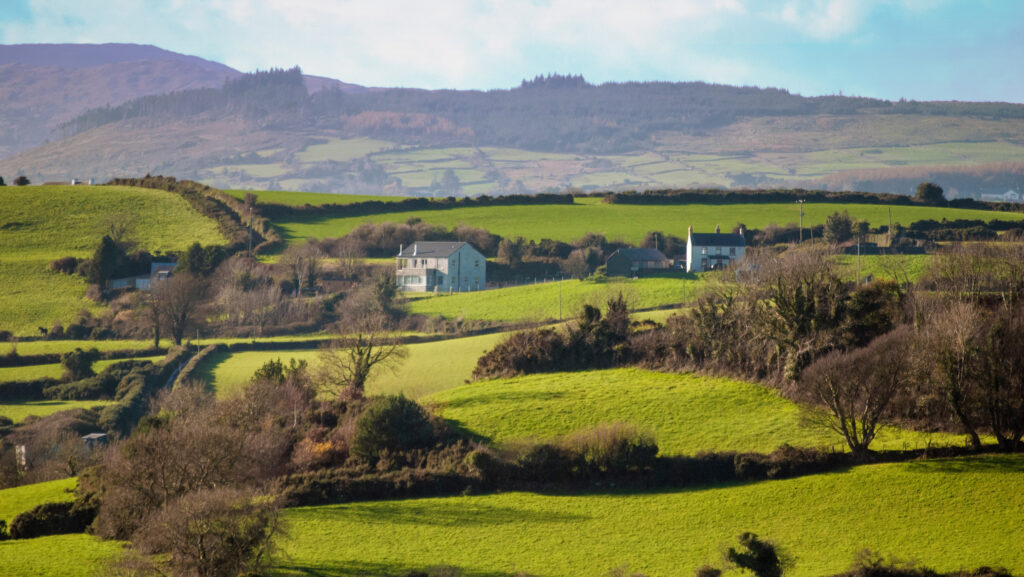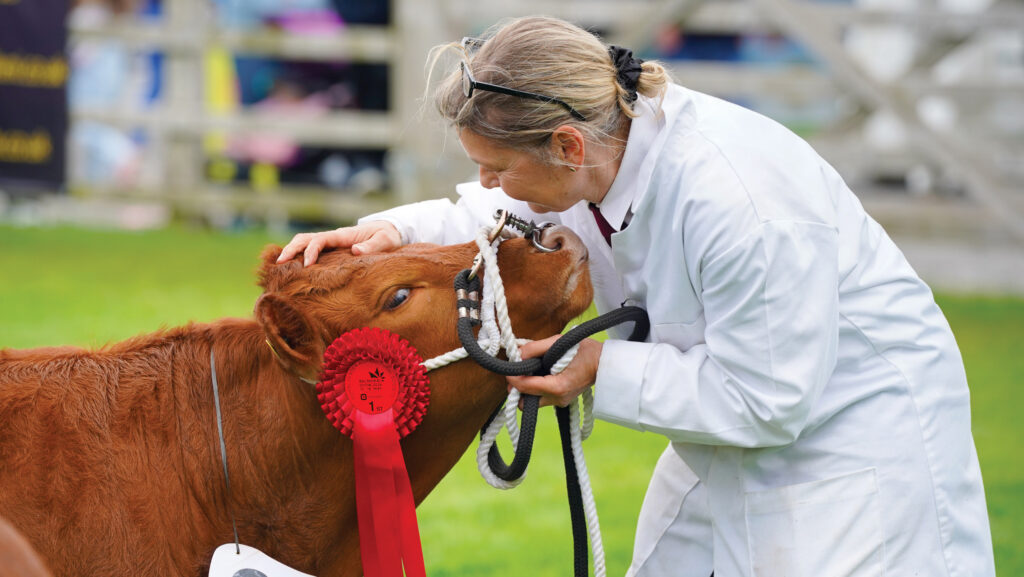NI farm policy shift creates challenges for livestock sector
 © Adobe Stock
© Adobe Stock Support for farm businesses in Northern Ireland is going through a transition period, away from the old Basic Payment Scheme (BPS) system of support and towards a Farm Sustainability Payment from 2026 onwards.
This shift in policy will see a greater focus on the environment and emissions on livestock farms.
It will have a big impact on farm businesses, with beef and sheep enterprises accounting for almost 80% of all farms in Northern Ireland, according to the Department of Agriculture, Environment and Rural Affairs’ (Daera) 2024 annual census.
See also: NI Sustainable Agriculture Programme – all you need to know
Dairy accounts for 10%, cereals 7%, pigs and poultry 3% and other types 2%.
The Windsor Framework agreement, introduced in 2023, allows farm businesses in Northern Ireland to benefit from access to both the UK and EU markets.
However, this framework comes with its own challenges, with NI still having to abide by some EU regulations and face additional administrative burdens.
Farmers in Northern Ireland are also set to be affected by changes to agricultural property relief and the agricultural organisations have been lobbying the government on it.
James McCluggage, policy manager at the Ulster Farmers Union (UFU), said MPs in Northern Ireland were already on side with farmers, and there was a cross-party consensus on the issue.
“Even though we don’t have any Labour MPs here in Northern Ireland, we are encouraging our members to write to rural Labour MPs in GB about what it is going to mean for them at a personal level,” he said.
Water quality
The agricultural sector in Northern Ireland has faced increased scrutiny by government due to pollution in Lough Neagh, the UK’s largest freshwater lake.
The re-emergence of blue-green algae in the loch this spring has put the spotlight back on the agriculture sector, even though pollution by water companies and the wider population also play a significant role.
Daera has opened an eight-week consultation until 26 June on a revised Nutrients Action Programme (NAP).
Daera minister Andrew Muir said: “The problems in Lough Neagh and other waterways are challenges we must address urgently; we must take actions to improve our water quality and meet our legal obligations.
“This is why it is essential to review NAP and consider additional measures to reduce the overall phosphorus surplus in our agricultural system.”
Proposed changes to NAP are set to take effect from 1 January 2026 and are expected to lead to significant challenges for agricultural businesses.
The proposals include additional restrictions on the use of phosphorus fertiliser products and a move towards low emissions spreading equipment for all farmers over a phased five-year period.
Another measure is an individual farm phosphorus balance limit, which is expected to impact 3,100 livestock farms.
UFU president William Irvine said: “Farmers are not shying away from their responsibilities.
“For the past 20 years, since NAP was first introduced, we have been implementing practices to improve water quality.
“We fully recognise the need to protect and improve water quality, but it must be done in a way that’s balanced, fair and grounded in the day-to-day realities of farming in NI.
“The proposals within NAP reflect a clear disconnect with local agriculture and fail to deliver what’s truly needed.”

UFU president William Irvine © UFU
Agricultural policy
The UFU says gaining planning permission for livestock buildings is one of the big challenges for NI farmers, due to environmental regulations linked to ammonia.
Reducing ammonia emissions has been labelled a “key departmental priority” by Daera, with 97% of NI ammonia emissions reportedly coming from agriculture.
Daera says: “Northern Ireland is responsible for 12% of UK ammonia emissions, despite only having 3% of UK population and 6% of the land area.
“This relatively high contribution reflects the importance of the agriculture sector to our economy and the nature of Northern Ireland as a food-exporting region in which agriculture is dominated by livestock.”
Roughly 250 designated sites have been classed as sensitive to the impacts of ammonia and nitrogen in NI.
Special restrictions on land near these sites make it significantly harder for livestock enterprises to get planning permission for buildings.
This is impacting agricultural businesses across the country, with more than 95% of land in NI in relatively close proximity to one of these designated sites.
UFU assistant policy manager Aileen Lawson said: “Ammonia is a significant issue in Northern Ireland because it effectively prevents or makes planning permission extremely difficult for the majority of farmers for anything livestock related, such as slurry stores and livestock housing.”
Ms Lawson said many NI farm businesses had faced difficulty getting permission to even replace old existing farm buildings with more modern sheds.
This is because the regulations do not properly account for existing emissions and treat these sheds as if they were brand-new developments.
Environment
The NI Climate Change Act 2022 sets a legal target for at least a 100% reduction in net-zero greenhouse gas (GHG) emissions by 2050.
To help meet these targets, Daera is working to produce a Climate Action Programme for NI to set out how the agricultural sector will deliver this.
The programme is due to be unveiled later this year.
Mr Irvine said: “We [farmers] are perceived as a problem here and actually we are moving further and faster than the rest of society to address climate change and the rest of the problems that are out there.
“People take food for granted.
“We talk about food security and politicians pay lip service to it and then forget about it.”
NI support schemes
A number of agriculture support programmes have been unveiled by Daera in the past year, and the full Farming with Nature Scheme is due to be introduced from 1 January 2026.
This is currently in the co-design phase, with both farming and environmental groups feeding into the proposals.
UFU policy manager James McCluggage said there was legislation in place to move onto the new scheme, but specific details, such as payment rates, had not been decided yet.
More details are due to be unveiled this summer.
Existing schemes
A Beef Carbon Reduction Scheme and a Suckler Cow Scheme are both available to farmers in NI through the Beef Sustainability Package.
Daera’s Suckler Cow Scheme opened on 1 April, with payments of up to £100 a cow available for farm businesses that manage to achieve the reduced calving interval thresholds.
The second year of the Beef Carbon Reduction Scheme opened on 1 January 2025, which incentivises beef producers to achieve an earlier slaughter age.
Payments of £75 for each eligible animal will be paid to farm businesses.
The UFU has called for similar support for the sheep sector. Deputy president Glenn Cuddy said: “Sheep support has finally been given ministerial attention after months of engagements with Daera’s policy team.
“On the one hand, it’s positive to have some idea of a timeline for sheep support, but on the other, it’s completely unjust that our farmers are still waiting for actual progress to be made.
“They feel left behind while new schemes are being rolled out for other sectors.”
The UFU also says the young farmer top-up payment is due to end this year, but a replacement is yet to be formally announced.
Diseases
Bovine TB poses a major challenge for the beef sector in NI, with herd incidence levels hitting almost 11% in the 12 months to February 2025.
A TB Partnership Steering Group was established in January 2025 to help tackle the issue, however, culling badgers for TB control is still not allowed.
Mr McCluggage said: “The compensation bill will probably stick out like a sore thumb.
“You have got an inflationary increase because cattle prices are so good and you have an increase because the TB incidence is so bad.
“It’s a perfect storm that needs to be addressed.”
Also, since foot-and-mouth was discovered in Europe earlier this year, all countries are alert to the risk of imports.
However, due to the Windsor Framework, NI is not allowed to ban personal imports of meat like the UK has.
Balmoral Show
An entry of more than 3,500 head of livestock are due to compete later this month at the 156th Balmoral Show, from 14-17 May.
The first day of Northern Ireland’s largest agricultural show will include sheepdog displays by former national champion Robert Goligher, along with shearing competitions and livestock classes.

© RUAS
A stock judging competition is set to take place on the second day of the event, hosted by Young Farmers’ Clubs of Ulster.
Dairy is set to take centre stage on the third day of the show as herds compete for the Dairy Champion of Champions title.
The main ring is also set to host the annual cattle parade and see the return of JCB’s “Dancing Diggers” for the first time in 30 years.

© RUAS
Rhonda Geary, group operations director at the Royal Ulster Agricultural Society, said: “We are so excited to welcome everyone back to the 2025 Balmoral Show.
“The ‘Balmoral Buzz’ is already taking hold and our packed programme is sure to be one to remember.
“With outstanding local food and drink, live music from the Downtown Show Stage, first-class entertainment, remarkable livestock, sheep shearing, show jumping and much, much more, we can’t wait to celebrate our proud agri-food industry with you all.”
